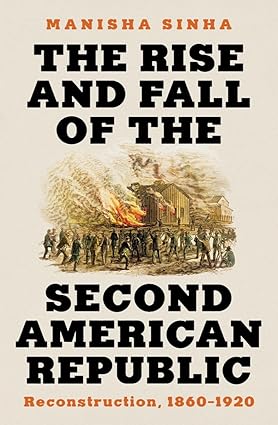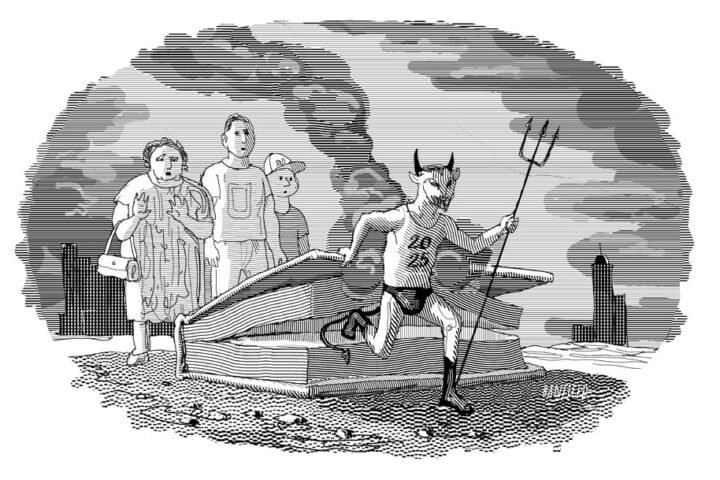Books Reviewed
In the 1960s, the historiography of the Reconstruction period underwent a tectonic shift. Scholars like Kenneth Stampp, Eric McKitrick, and John Hope Franklin began dramatically to revise the story of the era just after the Civil War. Inspired by the civil rights movement then underway, they successfully challenged accounts of Reconstruction by adherents of the “Dunning school” (named after William Archibald Dunning, a Columbia University historian and political scientist).
Dunning’s disciples had portrayed Reconstruction as a shameful period when congressional Radicals vindictively imposed a harsh and punitive peace on the poor, downtrodden South. Radicals subjected the gallant Confederate states to rule first by the military and then by state governments which grossly abused their supposed constituents. These new legislatures were manned by an unholy alliance of ignorant, easily manipulated blacks; greedy Northern carpetbaggers; and uncouth native white outcasts (scalawags). Congress trampled the Constitution underfoot, unjustifiably impeaching the statesmanlike President Andrew Johnson for attempting to implement the generous, humane, and merciful Reconstruction plan that Abraham Lincoln had launched during the war. Eventually the oppressed, overtaxed, and demoralized Southern whites rose up and restored honest government to their region.
The revisionists successfully debunked that version of events. Their efforts culminated in 1988 with the publication of Columbia University historian Eric Foner’s magisterial (736 pages) contribution to the New American Nation series, Reconstruction: America’s Unfinished Revolution, 1863–1877, widely regarded as the authoritative work on Reconstruction. On the basis of prodigious research, Foner chronicled in detail the efforts of black and white Radicals to make emancipation a living reality, granting to African Americans freedom, civil rights, and the elective franchise (for males). These noble efforts succeeded for a brief time, creating a true biracial democracy. But that was soon overthrown by white Southern violence, intimidation, and fraud, abetted by the North’s rapidly waning interest in promoting racial justice.
After the appearance of Foner’s book, the question facing scholars of Reconstruction was: now what? The answer has been to broaden the scope of Reconstruction both geographically (including developments in the western states as well as the world overseas) and chronologically (beyond 1877). The equivalent of Foner for this new era in the discipline is Stanford’s Richard White, whose similarly magisterial (968 pages) The Republic for Which It Stands: The United States During Reconstruction and the Gilded Age, 1865–1896 appeared as part of the Oxford History of the United States series in 2017.
***
Now, seven years after the publication of White’s magnum opus, Manisha Sinha of the University of Connecticut has gone White one better, expanding the story by a couple of decades in The Rise and Fall of the Second American Republic: Reconstruction, 1860–1920. Sinha is an accomplished scholar whose previous book, The Slave’s Cause: A History of Abolition (2016), was longlisted for a National Book Award and won several other accolades besides. This new volume is really two books in one: the first 300 pages focus on the Reconstruction period as usually defined (culminating in 1877), and the remaining 150 pages carry the story forward by another half-century. Professor Sinha considers the four decades after 1877 part of the “Greater Reconstruction,” broadly conceived. Her central argument is that the U.S. enjoyed a brief period of enlightened progress (1860–1877), but that the yeasty idealism of those years faded as the conscience of the public fell asleep. She summarizes her story with a quotation from W.E.B. Du Bois’s Black Reconstruction in America, 1860–1880 (1935): “The slave went free; stood for a brief moment in the sun; and then moved back again toward slavery.”
The alternative cutoff date to 1877 (the one most often cited by historians) is 1890, when Congress failed to pass legislation protecting black voting rights and Mississippi adopted an effective plan for disenfranchising African Americans, inaugurating the era of Jim Crow. Another proposed cutoff date is 1896, when the Supreme Court in Plessy v. Ferguson declared segregation constitutional. But Sinha rather awkwardly dates the end of Reconstruction to 1920, when the 19th Amendment included women in the franchise. That reform represented, she argues, the final achievement of the spirit that motivated the passage a half-century earlier of the 13th, 14th, and 15th Amendments.
***
Sinha’s cutoff date makes sense only if the Reconstruction period is considered an effort not simply to bring about the full-fledged liberation of African Americans but also to emancipate women, which is a stretch. In fact, the ratification of the 19th Amendment was the culmination of a women’s movement dating back to the 1840s, while the ratification of the 13th, 14th, and 15th was the culmination of the anti-slavery project begun in the late 18th century. To be sure, there was some overlap between both stories—more, perhaps, than has been traditionally acknowledged—but the extent of that overlap was not as great as suggested by Professor Sinha.
Both parts of this book offer a rather familiar progressive account of the main political, social, and economic events of the period. Sinha hews closely to Foner, under whom she studied at Columbia. Her special contribution is to leaven the story by emphasizing the essential role of grassroots activists and female changemakers. “Women activists…are central to the history of the Second American Republic,” she maintains. Indeed, she draws attention to many little-known activists and feminists in addition to more familiar icons like Elizabeth Cady Stanton and Susan B. Anthony.
Those two leaders of the movement for women’s suffrage found themselves in a bind during the immediate post-Civil War years, when the 15th Amendment to secure black male suffrage was enacted. They took exception to the argument made by their important ally, the famed radical orator Wendell Phillips, who in May 1865 announced to the American Anti-Slavery Society: “As Abraham Lincoln said, ‘One war at a time,’ so I say one question at a time. This hour belongs to the negro.” The “negro’s hour” became a mantra of most Radicals, who feared that pressing to enfranchise blacks and women simultaneously would doom both efforts. “I think such mixture would lose for the Negro far more than we should gain for the woman,” Phillips declared. Disenchanted by this “first the negro, then the woman” strategy, Anthony and Cady Stanton turned on their colleagues and opposed the 15th. In the process, they said some ugly things about black men to the effect that they were much less qualified to serve as informed, thoughtful, educated voters than were women like themselves. To her credit, Sinha frankly acknowledges that many of the reformers whom she celebrates—among them champions of such causes as workers’ and immigrants’ rights, socialism, land reform, Native-American autonomy, and anti-imperialism—were tainted by the same racism that marred the women’s suffrage movement.
***
Another major contention of the book is that the Reconstruction period was transformational not just because it seriously promoted racial justice and thereby helped advance the kind of thinking that eventually led to the enfranchisement of women, but also because it introduced the concept of the welfare state and the notion that the federal government had a duty to protect the rights of all. It is customary to think of the latter developments as products of the 20th century, not the Reconstruction era. But it’s true that the thin end of the welfare state wedge was inserted by the Freedmen’s Bureau, which Sinha calls “the first government social welfare agency in US history.” Signed into law by Lincoln in March 1865, the statute created an agency to help freedpeople in myriad ways, becoming a “sort of proxy state for African Americans.” It acted as an employer, a legal defense firm, a police force, a school system, and a relief provider, among other things. In her strongest chapter, Sinha makes good use of the Bureau’s records and acknowledges that despite its many shortcomings, its mission “as a clearing house for freedpeoples’ concerns and needs” was “remarkably successful.” She makes a point of noting, however, that Bureau Commissioner General O.O. Howard was “paternalistic,” a characterization she applies to many other white friends of racial justice.
Among the most important of those friends was Lincoln, whose assassination profoundly changed the course of history for the worse. It was not inevitable that the First Reconstruction (1863–1877) would fail to achieve what the Second Reconstruction accomplished in the mid-20th century. We cannot say for sure what Lincoln would have done had he lived. But, as Sinha indicates, he was definitely moving in the Radical direction as the war drew to a close. Instinctively a “racial egalitarian,” (my term, not hers), Lincoln would probably have implemented a far different policy from the one actually pursued by the egregious racist Andrew Johnson, arguably the country’s worst president. Sinha correctly notes that the conservative Reconstruction plan Lincoln proposed during the Civil War was not the course he would have pursued after Appomattox, when it was no longer necessary to inveigle the rebels into surrendering.
***
One of Johnson’s most egregious mistakes was to mislead white Southerners into believing that the North would be satisfied if they merely agreed to accept the formal abolition of slavery and renounce secession, in effect authorizing them to replace the old racial order with a kind of segregated dhimmitude. Lincoln would never have committed such a blunder. When Radicals seized the political reins from Johnson, he did everything he could to thwart their legislation, which he unsuccessfully vetoed. He had more luck subverting their intentions informally by abusing his power of appointment and the presidential bully pulpit. His maleficence in office was the sort of thing the framers of the Constitution had in mind when they empowered Congress to impeach and remove a president. (Johnson escaped the ignominy of removal by the margin of one vote.)
Lincoln was criticized for being slow to adopt the cause of black civil rights. But he plainly realized that the fundamental point he had made about the wrong of slavery applied equally to the wrong of second-class black citizenship. He endorsed black voting rights on April 11, 1865, just after Lee had surrendered. When the president spoke publicly in favor of black suffrage for the first time, a member of the audience—John Wilkes Booth—exclaimed indignantly to his companions, “That means n—– citizenship. Now by God I’ll put him through!” He did so three days later at Ford’s Theatre. Lincoln’s earlier hesitation to support black civil rights openly was not rooted in racism, as some have alleged, but rather in the sort of prudence that led his sharpest wartime critic, Wendell Phillips, to adopt the postwar policy of “first the negro, then the woman.” Lincoln understood that before the war it would have seriously undermined the cause of emancipation to press for both it and civil rights simultaneously.
***
To her credit, Sinha does not sneer at Lincoln’s approach but portrays it sympathetically. Her assessment of the following years, however, is almost relentlessly downbeat. She admires only the ordinary people—black and white—who attempted heroically to keep alive the idealistic spirit of the Reconstruction Radicals. The epigraph to the book is abolitionist Charles Sumner’s eloquent condemnation of color prejudice, but a more fitting one would be a stanza from “The Story of Hamburg,” by an unidentified anti-slavery poet whose work she quotes:
Let others tell of the nation’s glory –
I chant a lay of the nation’s wrong –
I strike no chords of mirth and gladness;
I tell the tale of the nation’s shame.
Professor Sinha tends to “write in a tone fit for judging criminals” (as Chekov said of journalistic critics of literature). Not only do political conservatives and progressive backsliders come in for condemnation bordering on contempt, but even Radicals like Wendell Phillips get scolded for every time they failed to toe the prevailing reformist line. This limits Sinha’s vision and leads her ultimately to plow little new ground besides arguing, unconvincingly, that Reconstruction ended in 1920. Perhaps a more balanced tale—acknowledging the nation’s glory as well as its shame—would be more worthy of her talents.




